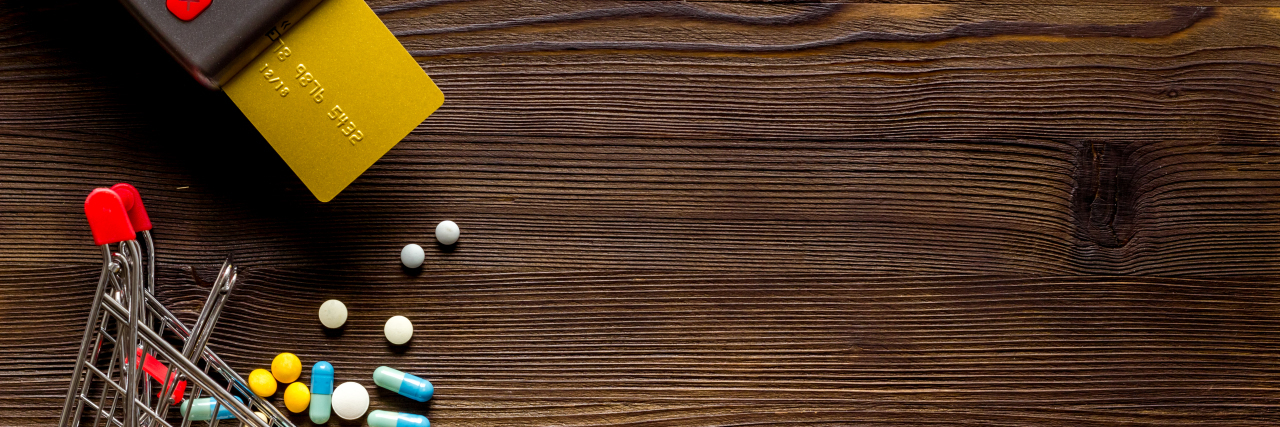I was off my meds. The side effects were loathsome, but there didn’t seem to be another option. I was an undergraduate, working two part-time jobs at my university. The thousands of dollars I borrowed in student loans primarily went to tuition and housing. My work study wages weren’t enough to cover my remaining necessities, so something had to give. That particular time I was running low on food, so I eyed my bank account; the pharmacy charges were higher than my other transactions. I made a choice—groceries over medication.
Being unable to cover the co-payment for my medications wasn’t a one-time experience. Several times in my life, I’ve had to weigh the pros and cons of having my medications over other necessities, over other ways of healing. The debate went beyond the basics of food and toiletries, I also had to make a choice between medication and my quality of life. While medication offered a baseline of stability, it couldn’t cure the social determinants of my health. I’d ask myself, do I buy comics to distract me when insomnia kept me up at night? Do I go to the concert of a band that made me feel good when nothing else could reach me? Do I buy clothing that fits well, and enables me to express myself? Do I go out with friends after I’d spent weeks isolated and alone? I envied my peers who could do it all without worry, those who could turn to their parents for money. Even with my limited funds, I often sent money home when my siblings reached out to let me know they hadn’t had dinner that day.
So many of us with disabilities struggle financially, exacerbating, and even contributing to, our disabilities. There are times when a health care provider is inaccessible because they are out-of-network. There are vital medications that our insurance won’t cover, costing hundreds of dollars to access. Some of us live on the meager funds of Social Security Disability Insurance (SSDI) or Supplemental Security Income (SSI), scraping by on what the government deems sufficient for us to live on—recipients of SSI can only have $2000 in total assets. This reality is unconscionable; we all have a right to health.
In the past year and a half, especially, I’ve been having nightmares and flashbacks to trauma experienced in my youth. I scour websites like Psychology Today, Therapy for Black Girls, and the National Queer and Trans Therapists of Color Network for an eye movement desensitization and reprocessing (EMDR) psychotherapy practitioner. EMDR helps to alleviate the symptoms of post traumatic stress disorder (PTSD), so I want the treatment. It is essential to me that the therapist I see is not a heterosexual, cisgender, white man. I want a provider with lived experience of some of my identities. A queer person of color is ideal. I am lucky to have decent health insurance through my employer, but as I scan the directories of therapists, I find that none of the providers who look like me accept my insurance. Some offer a sliding scale, most don’t. That is not the only barrier–my insurance provider has limits as to how much a provider can charge. For instance, one provider charges $260 a session for EMDR, but “based on the area of [my] provider $334.08 is the maximum charge that [my] plan may allow for the service rendered.” I was told I needed eleven sessions for effective treatment. The amount allowed would barely cover two.
When talking about disability, we need to talk about social determinants of health like wealth. Our current economic system–capitalism–prioritizes profit, which inherently deems those of us unable to advance the accumulation of wealth expendable. Fortunately, the disability community has long looked out for our own. We’ve created communities of care when society at large fails to meet our needs. This, however, is not in itself the solution. What we need is disability justice, a movement and framework created by disabled activists and organizers. In the 10 Principles of Disability Justice, arts organization Sins Invalid states, “In an economy that sees land and humans as components of profit, we are anti-capitalist by the nature of having non-conforming body/minds.” I am forever deepening my political education in terms of disability justice’s history and present moment, but one thing that is abundantly clear and consistent throughout: no one’s health should depend on their wealth.

